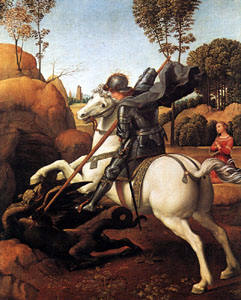

Today is the 23rd of April and is St Georges Day!!!
Here is a bit of history about St George although you will find many conflicting opinions about who he actually was / dates etc and how he became to be so popular.
St George is best known as the slayer of the dragon and
saviour of the maiden but, although this story exists in a number of different medieval literary versions and artistic representations, it is without any historical foundation and does not seem to have existed before the 11th century.
There is, in fact, every reason to believe that George was a genuine martyr who suffered at Lydda before the time of Constantine. Indeed, certain accounts record his death to be in the year 307. It is written that George was an officer in the Roman army who, after giving his goods to the poor at the outbreak of persecution, confessing his Christian faith and refusing to sacrifice to the gods, suffered "terrible tortures" which lasted for seven years and was eventually beheaded.
In Jerusalem, a monastery was erected and dedicated to him in the fifth century. Pilgrims in the Holy land between the sixth and eighth centuries speak of Lydda as the main place associated with George's cult (which resulted from his exploits) and final resting place of his relics - although the Coptic Church claims that these were transferred to Egypt and finally placed in the church dedicated to him in Old Cairo.
How he came to be regarded as patron of England is somewhat unclear, but he has been recognised here from at least the eighth century. His act of martyrdom was translated into Anglo-Saxon by Abbot Aelfric (c. 955-1020) and some pre-conquest churches were also dedicated to him (for example at Doncaster in 1061).
In 1222 a national synod at Oxford included a feast in George's honour among their lesser holidays, but it was not until after the battle of Agincourt in 1415 that it was included as one of the major feasts of the year.
St George is also the patron Saint of Mrs Danio's country Calalonia (Sant Jordi)
On this day men give a single red rose to the significant women in their lives (girlfriend and so on), and women give a book in return - April 23rd coincides with the deaths of Cervantes and Shakespeare - now many men also give women a book too.
This is one of the most colourful days in Catalonia, as thousands of rose-sellers take to the streets and bookshops set up open-air stalls along the major thoroughfares.
Wicked hey.
Just for the record ... In 1995, and taking a cue from Catalonia, UNESCO declared April 23 "World Book Day" to encourage people to buy books, to think about books, and simply read more.
Hapy St Georges Day everyone - Danio












